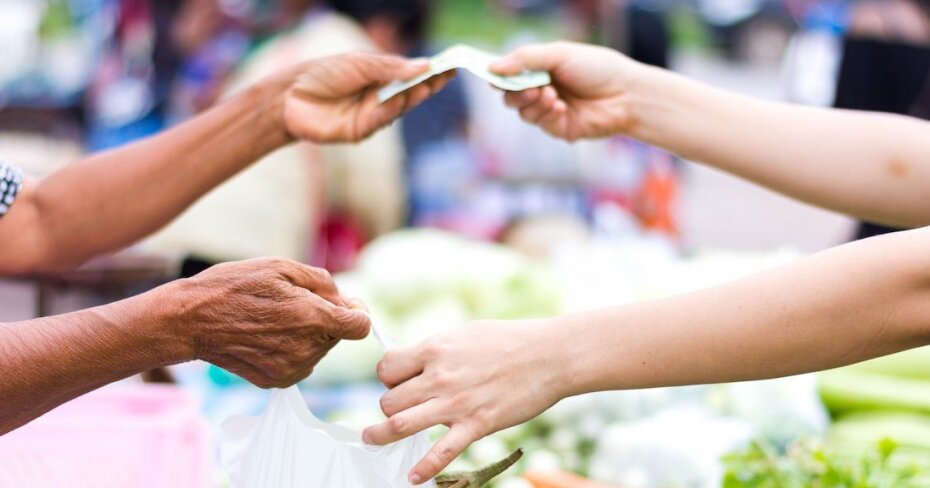I paid mostly with cash for a year and a half. This is what I learned
By: Sinead Mulhern on July 9, 2019
I used to pay for everything with plastic. I purchased morning coffees with the lazy tap of my debit card. When my dinner bill came, I keyed in my pin, crumpling the receipt to hide the evidence. I bought groceries, hygiene products and over-priced to-go lunches all with my card. When the 3:00 p.m. slump rolled around, I sauntered to the corner store and bought snacks by barely lifting a finger as I tapped my card yet again.
That was a year and a half ago. I was living in downtown Toronto. While I didn’t struggle with the debt that so frequently makes news in Canadian headlines (Canadians collectively owed $2.3 trillion as of the first quarter of 2019, according to Statistics Canada), my bank balance was often news to me as I unintentionally strayed from my budget and savings goals by giving my debit card a workout. Our rainbow-coloured cash was a rarity in my wallet and when I withdrew it, I often chose not to look at the receipt. Ignorance is bliss.
In early 2018 though, I moved to South America (first Colombia, then Ecuador) where folks tend to use— gasp!— real, physical money. It’s not that using credit cards is a complete no-go there but in many, many places of business, it’s not an option. This move for me was therefore the beginning of what was basically a cash-only year and a half. During this forced personal finance experiment, I learned some amazing things about money and spending and I changed my habits for the better by becoming more aware of what I was spending and when. Below, are my most significant realizations.
Money becomes more tangible when you see it disappear
I remember the exact moment when I understood that while living abroad, I was going to have to use cash. I was having after-work drinks with a friend in Medellin. When I tried to pay my portion of the bill with my credit card, the bartender stared at me blank-faced. They didn’t have a machine. “Welcome to Latin America, honey,” my friend lovingly quipped. “We don’t really do that here.”
Since then, I’ve learned to carry real money in my wallet. Because I see the notes and coins disappear from my purse, I’m more careful about how I spend it. Since I know exactly how much I can spend at the grocery store, I don’t mindlessly toss things into the cart in case I go even a few dollars over budget. I don’t buy unnecessary things for no reason because I realize I’ll likely leave myself short for something I actually need later. Paying in the moment rather than by a bill due date or by instantly tapping that money out of a bank account means you feel the consequences of spending money immediately. Because of this, the value of a dollar is more apparent and relevant.
Being overcharged becomes more frustrating
When I lived in Toronto, it was too easy to disconnect from my spending habits. I could overspend on a Friday and choose not to look at my balance until Monday. I could decline receipts or justify expensive purchases, ignoring the voice in my head that told me I wasn’t spending responsibly. When spending cash, you cannot bury your head in the sand like this. When you’re forced into being aware of the amount you’re forking out, you stop passively accepting being ripped off, too. A concrete example for me: I don’t purchase produce from the grocery store when the market down the street sells better goods for a third of the price. I’m not going to buy myself a gringo-priced lunch when most local restaurants have equally delicious food at a fraction of the cost.
Since I have to withdraw cash, knowing how quickly I’m spending is unavoidable
When you have to actually walk to an ATM every time you run out of cash, you know exactly how fast you’re spending your money. It’s rather sobering to have to walk to an ATM just a mere few days after my last withdrawal knowing that I just blew my budget. This feeling is the exact opposite of unknowingly and unintentionally racking up a larger-than-usual credit card bill or spending most of your last paycheque. The act of having to run an errand to take out cash is also, quite frankly, annoying. A 10-minute walk to a bank is really inconvenient compared to effortlessly tapping a debit card at a restaurant. If you’re like me, you’ll do what you can to avoid it (i.e. spend your bucks slowly). That’s a plus for your bank account.
Convenience purchases become a thing of the past
There are times when convenience seems worth the extra cost: the Uber home after a long day; online shopping; takeout dinners instead of cooking; to-go coffees when running late. At the time, that extra few dollars may feel worth it for the twenty minutes that they save but when looking at account activity later, they add up. A cash-mostly approach eliminates a lot of these fees and believe me, it’s a real money saver. When Uber doesn’t exist and cabs refuse to break a $20 because of the inconvenience, you find yourself walking that extra 15 minutes. I should add too that if a place favours cash over credit cards, that’s probably an indicator of a slower pace of life in general. These places that open at the crack of dawn to serve a coffee-addicted North American crowd don’t exist near me. Shops don’t have pre-made sandwiches for people who can’t spare 10 minutes to make their own. My favourite restaurants aren’t even aware that Uber Eats just came to town. It means I have to be more organized but hey, that pays!
I see online shopping for the menace that it is
I wasn’t a big online shopper when I lived in Canada. Now that it’s not an option, however, (the mail system isn’t reliable…), I can’t even be tempted. Like the convenience costs, I’ve realized that online shopping is just the easy way out and a perfect way to amass a huge credit card bill. If I want something, I must go out and buy it. Since that means I have to plan a shopping trip in advance, I’m quick to scrap it if the item is something I don’t really need. My point: your laziness will pay you if you eliminate online shopping apps. In fact, that’s a money tip every Canadian ought to consider. The average household in Canada only saved 1.1% of its income in the first quarter, according to the Financial Post. That’s close to the lowest on record since the 1960s, but not really surprising considering we’re living in an age where we can impulse buy without moving a muscle.
Using cash rubs off on others
When you and your best friends aren’t inattentively swiping plastic cards everyday, everyone becomes more aware of the value of things. This increased awareness of price differences means that others are more likely to express frustration with expensive bars, shops or restaurants rather than passively accepting unfair prices. The result is actually the opposite of a keeping-up-with-the-Joneses mentality. When you collectively feel the sting of paying for the fancy cocktails immediately after you have them, the happy hour deal down the street looks pretty good. Canadians as a group would actually do well to be more outraged by our day-to-day costs. That same Financial Post report indicated that our debt to disposable income ratio is among the highest in developed countries.
That said… watch your credit score!
Spending mostly cash for a year and a half has led to an awareness around my spending habits that I lacked before. I feel more in control of my money when my purchases are a physical exchange and when I’m using a method that has me able to see what is (and isn’t!) in my wallet as the week goes on. There are also no surprises about my bank balance and credit card statement. That said, there can easily be a downside of a cash-mostly approach if you don’t pay attention. Our credit card system rewards those who use credit cards and won’t take kindly to someone who breaks off the relationship with theirs entirely.
Over the past year, my credit score actually climbed back up by more than 100 points. That’s because it initially took a dive earlier in my travels when I first went MIA with my usage and then, due to unforeseen circumstances, I racked up a balance that I wasn’t able to pay off. Thankfully my anxiety-riddled self became diligent in paying off that sum on a regular basis. I should also add that my credit card and I aren’t estranged thanks to things like (to name a few examples) flights, my monthly local health insurance, the recent addition of Uber Eats pizza deliveries and my obsession for ordering books on my iPad. I actually prefer a cash-only approach these days because it holds me accountable and makes me think twice about even the smallest of purchases, but thanks to the credit system, I have to make sure to use my card where I can. That’s not something I had thought about before — so to anyone thinking about cooling it with the cards, my advice is to cut back… without cutting them up.


